人教版(2019)必修第三册Unit 4 Space Exploration Discovering Useful Structures 课件(共22张PPT,内嵌音频)
文档属性
| 名称 | 人教版(2019)必修第三册Unit 4 Space Exploration Discovering Useful Structures 课件(共22张PPT,内嵌音频) |
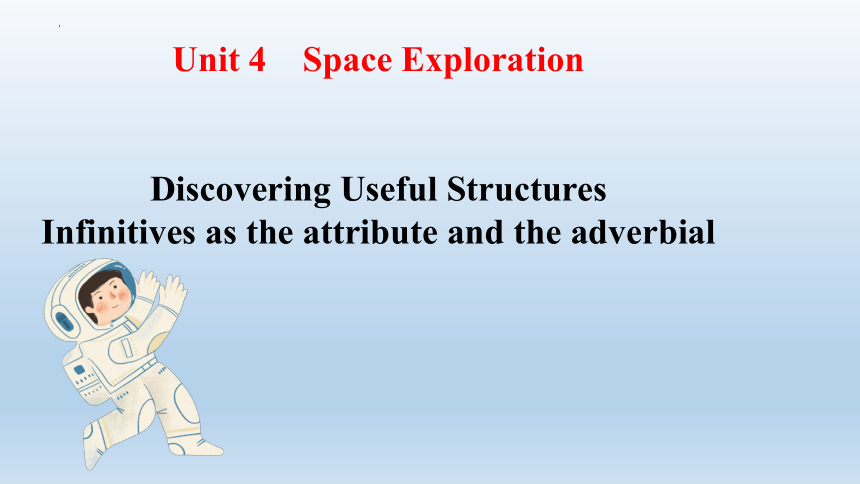
|
|
| 格式 | pptx | ||
| 文件大小 | 11.7MB | ||
| 资源类型 | 教案 | ||
| 版本资源 | 人教版(2019) | ||
| 科目 | 英语 | ||
| 更新时间 | 2024-09-06 20:14:24 | ||
图片预览

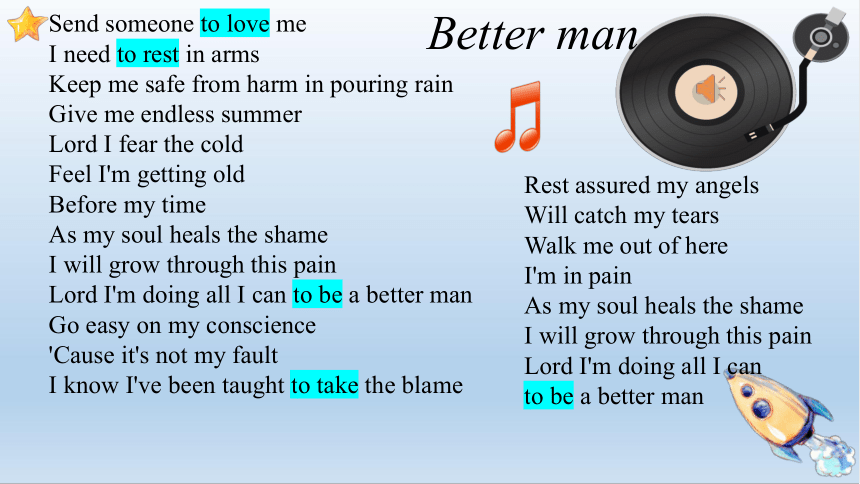
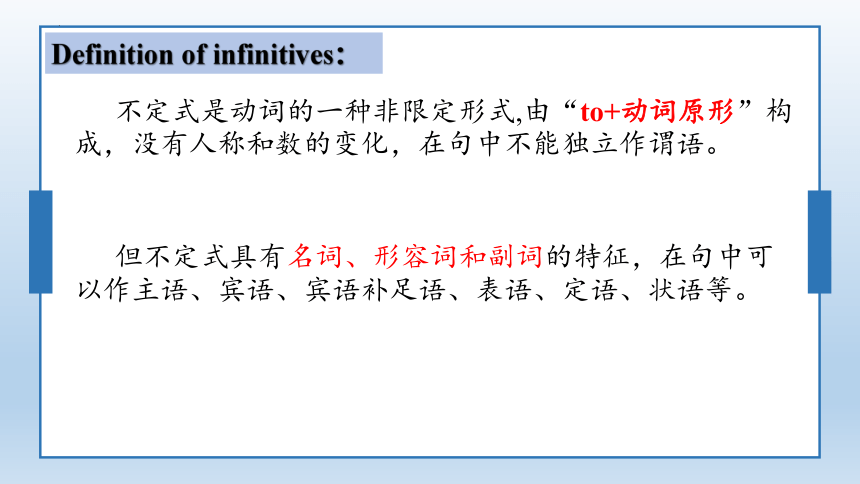

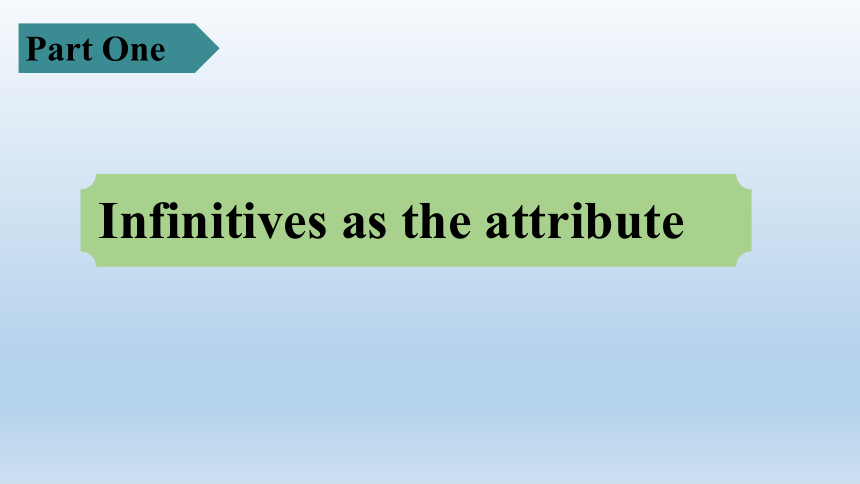

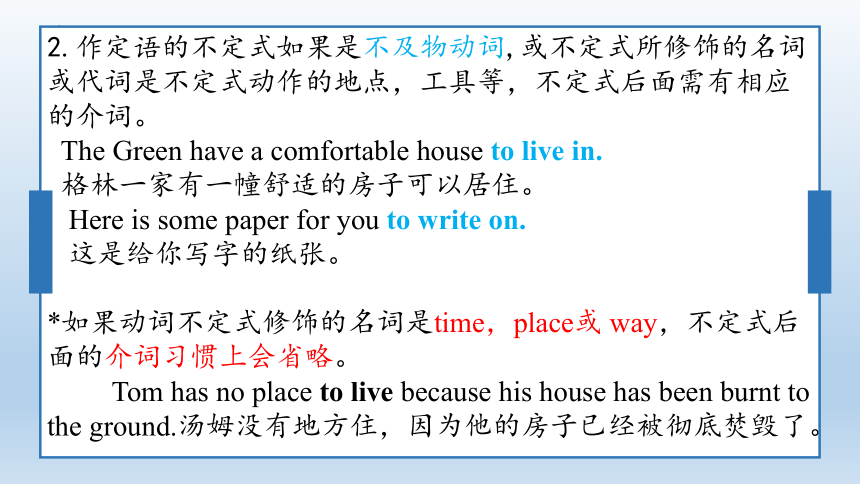

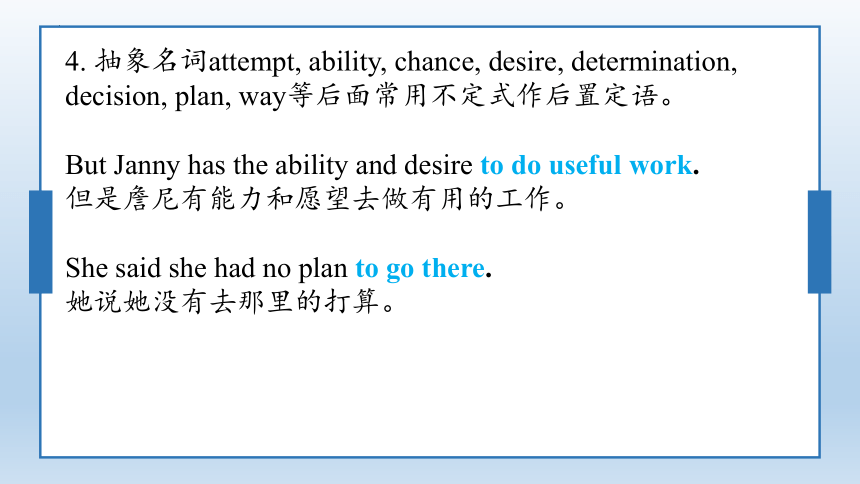
文档简介
(共22张PPT)
Unit 4 Space Exploration
Discovering Useful Structures
Infinitives as the attribute and the adverbial
Send someone to love me
I need to rest in arms
Keep me safe from harm in pouring rain
Give me endless summer
Lord I fear the cold
Feel I'm getting old
Before my time
As my soul heals the shame
I will grow through this pain
Lord I'm doing all I can to be a better man
Go easy on my conscience
'Cause it's not my fault
I know I've been taught to take the blame
Rest assured my angels
Will catch my tears
Walk me out of here
I'm in pain
As my soul heals the shame
I will grow through this pain
Lord I'm doing all I can
to be a better man
Better man
1. 动词不定式作定语常放在名词或不定代词后面作后置定语, 表示尚未发生的动作。
Definition of infinitives:
不定式是动词的一种非限定形式,由“to+动词原形”构成,没有人称和数的变化,在句中不能独立作谓语。
但不定式具有名词、形容词和副词的特征,在句中可以作主语、宾语、宾语补足语、表语、定语、状语等。
以下不定式充当什么成分?
To live abroad is not easy.
She planned to visit her parents next week.
The question is how to get there.
The first person to come is Mr. Brown.
He went to France to learn French.
His father encouraged him to find a new job.
主语
宾语
表语
定语
目的状语
宾语补足语
Infinitives as the attribute
Part One
1. 动词不定式作定语常放在名词或不定代词后面作后置定语, 表示尚未发生的动作。
1. 动词不定式作定语常放在不定代词或名词后面作后置定语, 表示尚未发生的动作。
Let us give him something to eat.
让我们给他一些吃的东西。
We have much homework to do tonight.
今晚我们有很多作业要做。
1. 动词不定式作定语常放在名词或不定代词后面作后置定语, 表示尚未发生的动作。
2.作定语的不定式如果是不及物动词,或不定式所修饰的名词或代词是不定式动作的地点,工具等,不定式后面需有相应的介词。
The Green have a comfortable house to live in.
格林一家有一幢舒适的房子可以居住。
Here is some paper for you to write on.
这是给你写字的纸张。
*如果动词不定式修饰的名词是time,place或 way,不定式后面的介词习惯上会省略。
Tom has no place to live because his house has been burnt to the ground.汤姆没有地方住,因为他的房子已经被彻底焚毁了。
1. 动词不定式作定语常放在名词或不定代词后面作后置定语, 表示尚未发生的动作。
3. 名词前有序数词和 last, next, only, no, all, any等词以及最高级修饰时, 其后要用动词不定式。
She was the first woman to win the gold medal in the Olympic Games.
她是第一个在奥运会中赢得金牌的女性。
You are the only person to be late.
你是唯一一个迟到的人。
1. 动词不定式作定语常放在名词或不定代词后面作后置定语, 表示尚未发生的动作。
4. 抽象名词attempt, ability, chance, desire, determination, decision, plan, way等后面常用不定式作后置定语。
But Janny has the ability and desire to do useful work.
但是詹尼有能力和愿望去做有用的工作。
She said she had no plan to go there.
她说她没有去那里的打算。
1. 动词不定式作定语常放在名词或不定代词后面作后置定语, 表示尚未发生的动作。
5. 当名词与定语之间存在动宾关系时。动宾关系指的是被修饰词是构成动词不定式的动词的逻辑宾语,所以作定语的不定式不能带宾语。
I usually have a lot of meetings to attend.
我通常有很多会议要参加。
She is a nice person to work with.
她是一个很好的合作伙伴。
1. 动词不定式作定语常放在名词或不定代词后面作后置定语, 表示尚未发生的动作。
6. 当名词与定语之间存在主谓关系时。主谓关系指的是被修饰词是构成动词不定式的动词的逻辑主语。此时的动词不定式在意义上相当于一个定语 从句。
We must find a person to do the job.
=We must find a person who/ that can do the job.
我们必须找到一个人来做这项工作。
We need someone to go and get a doctor.
=We need someone that can go and get a doctor.
我们需要有人去请医生。
我们接到了离开这个城市的命令。
7. 当名词与定语有同位关系时。同位关系指的是不定式对所修饰的名词的内容起解释、说明作用。
We got the order to leave the city.
我们接到了离开这个城市的命令。
They don't have enoueh evidence to prove that she was wrong.
他们没有充足的证据证明她是错的。
1. 动词不定式作定语常放在名词或不定代词后面作后置定语, 表示尚未发生的动作。
Practice
1. The airport _________________(complete) next year will help promote tourism in this area.
2. Do you have anything _______(do) tonight
3. The best way __________(improve) your English is to join an English club.
4. I’d like to have a few books_______(read) during the trip.
5. China is the third country in the world_______(send) men into space.
6. Mary had great determination _________(achieve) her goal.
7. The German girl has the ability ________(learn) Chinese well.
8. I have something important __________(tell) you.
9. The manager is the last ________ (come)to the meeting.
10. The little boy has no one ________________(play).
to be completed
to do
to improve
to read
to send
to achieve
to learn
to tell
to come
to play with
Infinitives as adverbial
Part Two
1. 动词不定式作定语常放在名词或不定代词后面作后置定语, 表示尚未发生的动作。
不定式作目的状语
动词不定式作目的状语时可位于句首或句末,句首常用逗号隔开,常用结构有in order to 和 so as to,但so as to不可位于句首。
To learn English well, you must put your heart into it.
She ran fast all the way so as to catch the last bus.
In order to pass the exam, Jane worked hard till midnight.
1. 动词不定式作定语常放在名词或不定代词后面作后置定语, 表示尚未发生的动作。
不定式作结果状语
多见于“too...to”;“enough to...”;“only to do”(常表示出乎意料的结果);“so/such...as to的句型中。
She is so proud as to look down upon others.
He went back home, only to find his house had been broken into.
特别提醒
现在分词与不定式
作结果状语的区别
01
Anxiously, she took the dress out of the package and tried it on, only to find it didn’t fit.
她焦急地从包裹里拿出衣服试穿,结果发现衣服不合身。
02
His father passed away, leaving him a little money.
他父亲去世了,留给他一点钱。
动词不定式作结果状语强调的是一种意想不到的结果;
而现在分词作结果状语强调的是一种顺承的,必然造成的结果。
1. 动词不定式作定语常放在名词或不定代词后面作后置定语, 表示尚未发生的动作。
不定式作原因状语
动词不定式常跟在一些形容词之后说明产生某种情绪的原因。常见的形容词有happy, lucky, surprised, sorry, glad,
delighted, anxious, interested, woried等。
We were astonished to find the temple still in its original condition.
She was disappointed to hear the news.
1. 动词不定式作定语常放在名词或不定代词后面作后置定语, 表示尚未发生的动作。
Practice
1. _________(make) himself heard, he raised his voice.
2. He is too honest a man ________(tell) a lie.
3. She got up earlier the next day so as__________(catch) the first bus.
4. As we all know, few people can live ________(be) a hundred.
5. The morning air is so good _________(breath) that he gets up early every day.
6. _______(enjoy) the convenience of digital payment, many senior citizens started to use smart phones.
7. She returened only ________(find) that no one was at home.
8. We must do what we can _______(help) those in need.
9. During the Spring Festival, families get together _________(enjoy) a big dinner.
10. He walks too slowly ________(get) there on time.
To make
to tell
to catch
to be
to breath
To enjoy
to find
to help
to enjoy
to get
一、用动词的适当形式填空
1)Our English teacher has many ways _____________(make) her class interesting.
2) He has a lot of work___________(do) every weekend.
3) They are looking for a room______________(live).
4) I have no chance__________ (go) sightseeing with so much work to do.
5)The airport ____________________(complete) next year will help promote tourism in this area.
6)The doctors are busy doing what they can _____________ (save) the dying man.
7)The old man was too angry _____________(say) a word.
8)He hurried to the station to see Tom off, only_____________ (find) he had already left.
Test for goals
一、用所给词的适当形式填空。
1. Our English teacher has many ways ________(make) her class lively.
2. He has a lot of work _______(do) every weekend.
3. They are looking for a room ____________(live).
4. I have no chance________(go) sightseeing with so much work to do.
5. The airport __________________(complete) next year will help promote tourism in this area.
6. The doctors are busy doing what they can ________(save) the dying man.
7. The old man was too angry ________(say) a word.
8. He hurried to the station to see Tom off, only _______(find) he had already left.
9. The meeting _______(take) place next week is sure to be a great success.
10. Helen had to shout _________(make) herself heard.
to make
to do
to live in
to go
to be compeleted
to save
to say
to find
to take
to make
1. 动词不定式作定语常放在名词或不定代词后面作后置定语, 表示尚未发生的动作。
二、语法填空。
1. ________(send) people to other planets or even beyond the solar system is not an easy goal 2. __________(achieve). One of the biggest
3. ___________(peoblem) is that the trip would take a very long time. For example, 4. ______(use) current technology, it would take over two years 5. ______(get) to the closest planet, Mars, and back. Although light is the fastest thing 6. _________(know) in the universe, it could take more than four years 7._________(reach) the nearest star system. Will scientists figure out a way 8. _________(store) sufficient food and water for the long journey Is it possible 9._________(travel) faster than light No one knows the answer yet. However, space scientists never give up. They are experimenting with growing crops in space so as 10. _________(help) astronauts get enough food on longer journeys through space.
Sending
to achieve
problems
using
to get
known
to reach
to store
to travel
to help
Thank you
Unit 4 Space Exploration
Discovering Useful Structures
Infinitives as the attribute and the adverbial
Send someone to love me
I need to rest in arms
Keep me safe from harm in pouring rain
Give me endless summer
Lord I fear the cold
Feel I'm getting old
Before my time
As my soul heals the shame
I will grow through this pain
Lord I'm doing all I can to be a better man
Go easy on my conscience
'Cause it's not my fault
I know I've been taught to take the blame
Rest assured my angels
Will catch my tears
Walk me out of here
I'm in pain
As my soul heals the shame
I will grow through this pain
Lord I'm doing all I can
to be a better man
Better man
1. 动词不定式作定语常放在名词或不定代词后面作后置定语, 表示尚未发生的动作。
Definition of infinitives:
不定式是动词的一种非限定形式,由“to+动词原形”构成,没有人称和数的变化,在句中不能独立作谓语。
但不定式具有名词、形容词和副词的特征,在句中可以作主语、宾语、宾语补足语、表语、定语、状语等。
以下不定式充当什么成分?
To live abroad is not easy.
She planned to visit her parents next week.
The question is how to get there.
The first person to come is Mr. Brown.
He went to France to learn French.
His father encouraged him to find a new job.
主语
宾语
表语
定语
目的状语
宾语补足语
Infinitives as the attribute
Part One
1. 动词不定式作定语常放在名词或不定代词后面作后置定语, 表示尚未发生的动作。
1. 动词不定式作定语常放在不定代词或名词后面作后置定语, 表示尚未发生的动作。
Let us give him something to eat.
让我们给他一些吃的东西。
We have much homework to do tonight.
今晚我们有很多作业要做。
1. 动词不定式作定语常放在名词或不定代词后面作后置定语, 表示尚未发生的动作。
2.作定语的不定式如果是不及物动词,或不定式所修饰的名词或代词是不定式动作的地点,工具等,不定式后面需有相应的介词。
The Green have a comfortable house to live in.
格林一家有一幢舒适的房子可以居住。
Here is some paper for you to write on.
这是给你写字的纸张。
*如果动词不定式修饰的名词是time,place或 way,不定式后面的介词习惯上会省略。
Tom has no place to live because his house has been burnt to the ground.汤姆没有地方住,因为他的房子已经被彻底焚毁了。
1. 动词不定式作定语常放在名词或不定代词后面作后置定语, 表示尚未发生的动作。
3. 名词前有序数词和 last, next, only, no, all, any等词以及最高级修饰时, 其后要用动词不定式。
She was the first woman to win the gold medal in the Olympic Games.
她是第一个在奥运会中赢得金牌的女性。
You are the only person to be late.
你是唯一一个迟到的人。
1. 动词不定式作定语常放在名词或不定代词后面作后置定语, 表示尚未发生的动作。
4. 抽象名词attempt, ability, chance, desire, determination, decision, plan, way等后面常用不定式作后置定语。
But Janny has the ability and desire to do useful work.
但是詹尼有能力和愿望去做有用的工作。
She said she had no plan to go there.
她说她没有去那里的打算。
1. 动词不定式作定语常放在名词或不定代词后面作后置定语, 表示尚未发生的动作。
5. 当名词与定语之间存在动宾关系时。动宾关系指的是被修饰词是构成动词不定式的动词的逻辑宾语,所以作定语的不定式不能带宾语。
I usually have a lot of meetings to attend.
我通常有很多会议要参加。
She is a nice person to work with.
她是一个很好的合作伙伴。
1. 动词不定式作定语常放在名词或不定代词后面作后置定语, 表示尚未发生的动作。
6. 当名词与定语之间存在主谓关系时。主谓关系指的是被修饰词是构成动词不定式的动词的逻辑主语。此时的动词不定式在意义上相当于一个定语 从句。
We must find a person to do the job.
=We must find a person who/ that can do the job.
我们必须找到一个人来做这项工作。
We need someone to go and get a doctor.
=We need someone that can go and get a doctor.
我们需要有人去请医生。
我们接到了离开这个城市的命令。
7. 当名词与定语有同位关系时。同位关系指的是不定式对所修饰的名词的内容起解释、说明作用。
We got the order to leave the city.
我们接到了离开这个城市的命令。
They don't have enoueh evidence to prove that she was wrong.
他们没有充足的证据证明她是错的。
1. 动词不定式作定语常放在名词或不定代词后面作后置定语, 表示尚未发生的动作。
Practice
1. The airport _________________(complete) next year will help promote tourism in this area.
2. Do you have anything _______(do) tonight
3. The best way __________(improve) your English is to join an English club.
4. I’d like to have a few books_______(read) during the trip.
5. China is the third country in the world_______(send) men into space.
6. Mary had great determination _________(achieve) her goal.
7. The German girl has the ability ________(learn) Chinese well.
8. I have something important __________(tell) you.
9. The manager is the last ________ (come)to the meeting.
10. The little boy has no one ________________(play).
to be completed
to do
to improve
to read
to send
to achieve
to learn
to tell
to come
to play with
Infinitives as adverbial
Part Two
1. 动词不定式作定语常放在名词或不定代词后面作后置定语, 表示尚未发生的动作。
不定式作目的状语
动词不定式作目的状语时可位于句首或句末,句首常用逗号隔开,常用结构有in order to 和 so as to,但so as to不可位于句首。
To learn English well, you must put your heart into it.
She ran fast all the way so as to catch the last bus.
In order to pass the exam, Jane worked hard till midnight.
1. 动词不定式作定语常放在名词或不定代词后面作后置定语, 表示尚未发生的动作。
不定式作结果状语
多见于“too...to”;“enough to...”;“only to do”(常表示出乎意料的结果);“so/such...as to的句型中。
She is so proud as to look down upon others.
He went back home, only to find his house had been broken into.
特别提醒
现在分词与不定式
作结果状语的区别
01
Anxiously, she took the dress out of the package and tried it on, only to find it didn’t fit.
她焦急地从包裹里拿出衣服试穿,结果发现衣服不合身。
02
His father passed away, leaving him a little money.
他父亲去世了,留给他一点钱。
动词不定式作结果状语强调的是一种意想不到的结果;
而现在分词作结果状语强调的是一种顺承的,必然造成的结果。
1. 动词不定式作定语常放在名词或不定代词后面作后置定语, 表示尚未发生的动作。
不定式作原因状语
动词不定式常跟在一些形容词之后说明产生某种情绪的原因。常见的形容词有happy, lucky, surprised, sorry, glad,
delighted, anxious, interested, woried等。
We were astonished to find the temple still in its original condition.
She was disappointed to hear the news.
1. 动词不定式作定语常放在名词或不定代词后面作后置定语, 表示尚未发生的动作。
Practice
1. _________(make) himself heard, he raised his voice.
2. He is too honest a man ________(tell) a lie.
3. She got up earlier the next day so as__________(catch) the first bus.
4. As we all know, few people can live ________(be) a hundred.
5. The morning air is so good _________(breath) that he gets up early every day.
6. _______(enjoy) the convenience of digital payment, many senior citizens started to use smart phones.
7. She returened only ________(find) that no one was at home.
8. We must do what we can _______(help) those in need.
9. During the Spring Festival, families get together _________(enjoy) a big dinner.
10. He walks too slowly ________(get) there on time.
To make
to tell
to catch
to be
to breath
To enjoy
to find
to help
to enjoy
to get
一、用动词的适当形式填空
1)Our English teacher has many ways _____________(make) her class interesting.
2) He has a lot of work___________(do) every weekend.
3) They are looking for a room______________(live).
4) I have no chance__________ (go) sightseeing with so much work to do.
5)The airport ____________________(complete) next year will help promote tourism in this area.
6)The doctors are busy doing what they can _____________ (save) the dying man.
7)The old man was too angry _____________(say) a word.
8)He hurried to the station to see Tom off, only_____________ (find) he had already left.
Test for goals
一、用所给词的适当形式填空。
1. Our English teacher has many ways ________(make) her class lively.
2. He has a lot of work _______(do) every weekend.
3. They are looking for a room ____________(live).
4. I have no chance________(go) sightseeing with so much work to do.
5. The airport __________________(complete) next year will help promote tourism in this area.
6. The doctors are busy doing what they can ________(save) the dying man.
7. The old man was too angry ________(say) a word.
8. He hurried to the station to see Tom off, only _______(find) he had already left.
9. The meeting _______(take) place next week is sure to be a great success.
10. Helen had to shout _________(make) herself heard.
to make
to do
to live in
to go
to be compeleted
to save
to say
to find
to take
to make
1. 动词不定式作定语常放在名词或不定代词后面作后置定语, 表示尚未发生的动作。
二、语法填空。
1. ________(send) people to other planets or even beyond the solar system is not an easy goal 2. __________(achieve). One of the biggest
3. ___________(peoblem) is that the trip would take a very long time. For example, 4. ______(use) current technology, it would take over two years 5. ______(get) to the closest planet, Mars, and back. Although light is the fastest thing 6. _________(know) in the universe, it could take more than four years 7._________(reach) the nearest star system. Will scientists figure out a way 8. _________(store) sufficient food and water for the long journey Is it possible 9._________(travel) faster than light No one knows the answer yet. However, space scientists never give up. They are experimenting with growing crops in space so as 10. _________(help) astronauts get enough food on longer journeys through space.
Sending
to achieve
problems
using
to get
known
to reach
to store
to travel
to help
Thank you
